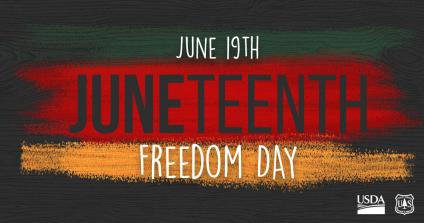Employee perspective: Celebrate Juneteenth with traditional Black American cuisine

USDA Forest Service does not endorse the content or products in any links included in this article. Links to external sources are included for informational purposes only.
Referred to as Freedom, Jubilee, Liberation or Emancipation Day, Juneteenth, which is June 19, marks the day in 1865 the announcement of General Order No. 3 by Union Army general Gordon Granger, proclaiming freedom from slavery in Texas. The announcement came two years after the signing of the emancipation proclamation by President Lincoln, and this day continued to be celebrated in Texas every year on June 19. In recent years, the popularity of Juneteenth has expanded well beyond the borders of the state of Texas, and there are efforts underway to make Juneteenth a national holiday. But no celebration is complete without food. The release last month of the documentary High on the Hog: African American Food History on Netflix shows the cultural connections between traditional Black American food ways to places such as Benin, West Africa.
It talks about how Black slaves turned those African food traditions into a distinctly Black American cuisine, and its influence on the broader American food traditions. Did you know that okra originally came from Africa? Or that rice was grown in Asia and Africa long before Columbus landed on this continent? Or that the classic dish macaroni and cheese was developed by a French-trained slave/chef who prepared it for Thomas Jefferson and his guests at Monticello? Based on a book by food historian Jessica B. Harris, the last episode of this four-part series touches on Juneteenth and the culinary traditions associate with the holiday.
The documentary and an article on Juneteenth and barbeque highlighted that red food and drink is used to symbolize freedom during a Juneteenth celebration. Food writer Michael Twitty is cited in the article as stating that the practice of eating red foods comes from the enslaved people from the Yoruba and Kongo tribes.
Red foods such as red sodas, barbeque and, likely, red velvet cake are served on June 19 as a way of celebrating Emancipation Day. This Juneteenth, why not join in the celebration by delving into the Black American food history? If you have Netflix, watch the documentary. If you do not have Netflix, cook a few of your own recipes or discover new recipes online that you can try at home. If you don’t like to cook, support Black entrepreneurs by finding a local restaurant that specializes in Black American traditional food like barbeque, or a Black-owned bookshop that likely carries Jessica B. Harris’s books on Black American food history or a cookbook with traditional southern or Black family recipes.
This is a great opportunity to learn about and experience Black American food traditions and an important aspect of our shared American history and culture.

